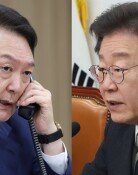Envious of Taipei-Beijing relations
When President Kim Dae-jung landed at Sunan Airport in Pyongyang in 2000, I was deeply touched even though I am a foreigner. I thought to myself that these people are reconciling this way. At that time, China-Taiwan relations were at the lowest point. Thirteen years have since passed. China and Taiwan are now engaged in active cooperation and exchange, making progress hand in hand. What have South and North Korea been doing over the years?
This is what a Chinese person remarked at a recent private meeting. As he pointed out, inter-Korean relations have remained stalled for a long time. North Korea pushed for nuclear weapons development, while South Korea has had swinging inter-Korea policies from administration to administration. This is a stark contrast to the sea change seen in Cross-Strait relations.
Taiwan and South Korea are similar in many aspects. Despite threat of aggression by communists, they both have achieved astonishing economic development to join the league of Four Asian Dragons. Since being kicked out from the Chinese mainland to Taiwan Island by Mao Zedongs Red Army in 1949, Taiwan had lived under martial law for 38 years. Even today, thousands of missiles on the Chinese continent are targeting Taiwan, while Taiwan also often conducts military drills to prepare for Chinas invasion. Given that China, the worlds second largest economy with hundreds of nuclear warheads, still considers Taiwan as part of its own territory, Taiwans security threat is no less serious than South Koreas.
The Chinese people have been flexible, however. Taiwanese President Ma Ying-jeau, who took power in 2008, vowed three things not to do. This strategy calls for the denial of unification, independence and use of force. Taipei seeks to improve ties with Beijing, while maintaining status quo. When a massive earthquake hit Chinas Sichuan Province, President Ma sent a condolence fund and conveyed a message, View the realty, build up trust, pursue common goals, and thereby achieve prosperity. Then Chinese President Hu Jintao replied by citing a poetic phrase, If you want to view an object at a long distance, you should climb up one story higher at the pavilion. The latter thus suggested that the two sides shelve conflicts for now to build up a world that is one level higher. China also had shared interest, because it adopted market economy amid socialist ideology in politics, and hence desperately needed peace and stability.
The two countries formed the Economic Cooperation Framework Agreement (ECFA) in 2010. ECFA is a treaty that is designed to remove tariffs on trade and guarantee investment just like a free trade agreement between two states. China and Taiwan that officially deny the other as sovereign nation used an expression slightly different from FTA. This treaty was like a blessing to the Taiwanese economy, which was being closely chased by emerging countries, and had yet to find growth engine for the next generation. That year, Taiwan saw its economic growth rate soar to 10.8 percent, the highest in 24 years. Ma, who killed the two birds of peace and economy with one stone of a flexible China policy, was reelected last year.
Currently, countless direct travel routes have opened between Taiwan and China, allowing people to freely move across the strait. Some in Taiwan still worry about its possible annexation by China. If the two become more inter-dependent economically, however, the chance for them to use weapons will become all the more remote.
The two Koreas have already experienced to some extent what synergistic effect can be created when capital and technology from the South meet with resources and labor from the North through the inter-Korean Kaesong Industrial Park. Signs are abound that Pyongyang desperately pursues economic development. The two Koreas need to pay attention for the cross-strait ties between Taiwan and China, which opened up a new chapter of cooperation through economic approach, while putting aside hard-to-solve political and diplomatic issues for now.
The Park Geun-hye administrations trust building process has hit a snag. It is easy to criticize Pyongyang for its treacherousness and frequent violation of promises. It is also important to follow principle and keep self-confidence in inter-Korean ties. However, if the administration fails to make any progress in inter-Korean relations by making excuses, it is an incompetent administration after all.







